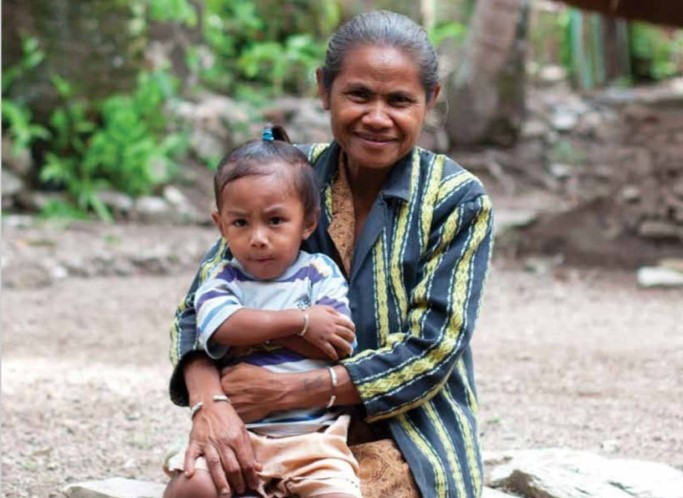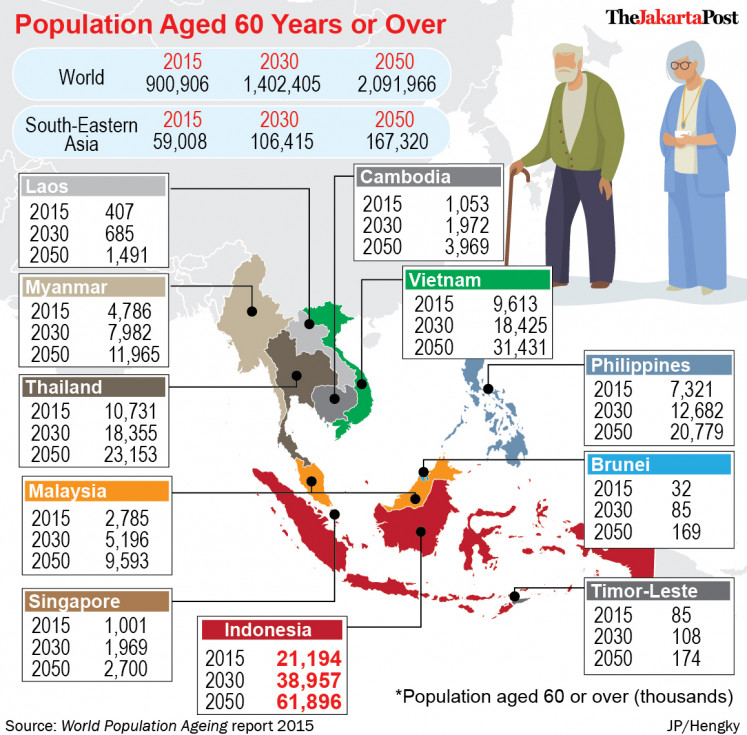Popular Reads
Top Results
Can't find what you're looking for?
View all search resultsPopular Reads
Top Results
Can't find what you're looking for?
View all search resultsMisperceptions exclude older people of their reproductive rights
Getting old is a fact of life, yet there are many negative images and false beliefs surrounding elderly people.
Change text size
Gift Premium Articles
to Anyone
W
hen it comes to sexual reproductive health and rights (SRHR), there is a common misperception that older people are not sexually active so they no longer need sexual health services and counselling.
Such stereotyping and discrimination against individuals or groups on the basis of their age is known as ageism.
“Ageism is a barrier to sexual health for older people. [Making] older people are excluded from sexual health programming,” said Caitlin Littleton, regional program advisor at HelpAge International Asia Pacific Region, which works in 75 countries, including Indonesia.
Littleton disclosed four main false beliefs about sexuality among older adults, including that older people are not able to have sex.
“In reality, inability to have sexual intercourse is linked with health issues rather than age.”
Another false belief is that older people do not want to have sex.
“In reality, many older people continue to desire sex for the same reasons younger age groups do, such as for pleasure, relationships, reducing stress and increased wellbeing,” Littleton said.
Others believe older people should not have sex, which she said is a largely an external viewpoint strongly reinforced by the media and societal norms, and some older people internalize this message. In reality, every adult should be able to safely and fully express their sexuality with respect to the rights of others, she added.
Some even believe older people do not have sex, while in actuality, just as with any age, there is a large variety in sexual frequency, activities and satisfaction.
“Dismantling ageist views and discriminatory practices regarding sexual health are essential in achieving progress on sexual health across the population, right to health, women’s rights, LGBT [lesbian, gay, bisexual, transgender] rights, older people’s rights,” she said.
Littleton gave a plenary presentation called the Sexual Health of Older People: An Overview at the 10th Asia Pacific Conference on Sexual Reproductive Health and Rights (APCRASRH10) virtual conference on Sept. 14.
The conference, themed Population Ageing and SRHR in Asia Pacific, is part of a series organized by the steering committee of APCRSHR10, United Nations Population Fund (UNFPA) and Citizen News Service (CNS).
The stereotype that individuals become asexual as they get older was also found by Tey Nai Peng, an associate professor at the Department of Applied Statistics at the University of Malaya.
“Old-age sexuality is a sensitive topic and taboo in many cultures,” he said at the conference.
In Malaysia, people aged 60 and over make up 10 percent of the population and the figure is projected to reach 24 percent in 2050. About 90 percent of older men are married compared to only 50 percent among older women.
He said one study, data for which came from the 2014 Malaysian Population and Family Survey, showed that about half of older Malaysians still had a sexual desire and maintained an intimate relationship with their spouses.
“About 80 percent share a bed and hold hands, and nearly 66 percent still hug and kiss their spouse. Overall, 57 percent of older men and 47 percent of older women have sex with their spouse,” he said.
“Sexuality is a lifelong need. Sexual activity remains an important aspect of life among older men and women. Education, health care, cultural practices, social media and the family have important roles in sustaining a happy and healthy sexual life in old age […]”
Indonesia has the fifth-largest elderly population in the world. (JP/Hengky)Globally, the number of persons aged 60 and over is projected to reach 2 billion by 2050, or one in every five persons, largely contributed to the decline in fertility rates and increasing life expectancy.
As per 2019 estimates, 548 million (60 percent) of the world’s older population lives in the Asia-Pacific region and the number is projected to rise to nearly 1.3 billion by 2050. Women comprise 52.9 percent of the older population in this region.
In Indonesia, which has the fifth-largest elderly population in the world, the World Population Ageing report in 2015 projected the number of 60-year-olds and above would reach 39 million in 2030, or 13.2 percent of the population, and 61.8 million in 2050 or 19.2 percent.
In 2017, data from Statistics Indonesia (BPS) showed the country had 23.4 million people older than 60, or around 8.97 percent of the total population.
All smiles: Sixty percent of the world’s older population resides in the Asia-Pacific region and the number is projected to rise to nearly 1.3 billion by 2050. (Courtesy of HelpAge International/-)Sai Jyothirmal Racheria, program director at Asia Pacific Resource Center for Women (ARROW), said in the Asia-Pacific region, women outlived men by at least four years on average.
“Currently, there are 90.8 men for every 100 women above 60 years and 69.5 men for every 100 women over the age of 80,” she said.
Women’s longer life expectancy and the consequent larger proportion of older women living alone throws challenges toward a number of issues, as older women have less income security, as well as limited access to resources and opportunities, including health care, adequate housing, social protection and legal justice.
Most countries in the region, she said, would face major challenges to ensure their health and social systems were ready to deal with the demographic shift in ageing.
Some countries, she said, had come up with best practices, such as in Japan, which has integrated long-term care insurance to protect people from the costs of care, or Thailand, which was strengthening the integration of health and social care as close as possible to where people live. South Korea, she said, had guaranteed a basic pension for all older persons since 2015.
In Indonesia, according to the 2017-19 World Social Protection Report, only 14 percent of people older than the statutory pensionable age receive an old-age pension (contributory, noncontributory or both), emphasizing their vulnerability.
“Some countries in the region have policies to provide free or subsidized health care for older persons […] However, the reach and range of services is a huge question,” Racheria said.
Despite their demographic significance and the lifetime impact of gender disparities, women considered older than the reproductive age are excluded from most investments in global public health.
“While development policies linking human rights with access to SRH care have improved the status of women and girls, older women have not benefited from these initiatives,” Racheria said.
In the age of COVID-19, elderly people are considered vulnerable and therefore, kept even more isolated from social interactions.
The conference’s chair, Sono Aibe, a United States based independent consultant who works with philanthropic and non-profit organizations, emphasized the challenges faced by older people in the low-income countries.
In low income countries, where healthcare resources are already very stretched, she warned that women who were not reached by reproductive and maternal health programs might be missing age appropriate preventive health education or regular check-ups or often had to deal with sometimes debilitating symptoms and psychological impacts all on their own.
“So, our commitment to SRHR needs means that we have to work to make the SRH needs of all people throughout their life cycle.”













